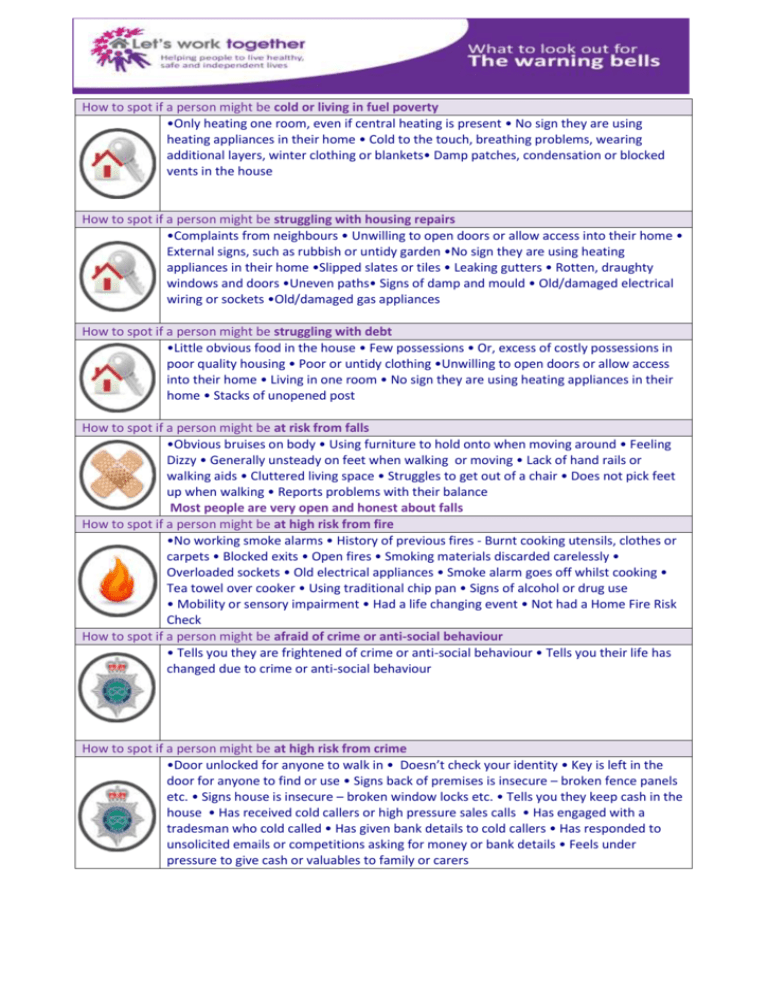lwt-warning-bells-final
advertisement

How to spot if a person might be cold or living in fuel poverty •Only heating one room, even if central heating is present • No sign they are using heating appliances in their home • Cold to the touch, breathing problems, wearing additional layers, winter clothing or blankets• Damp patches, condensation or blocked vents in the house How to spot if a person might be struggling with housing repairs •Complaints from neighbours • Unwilling to open doors or allow access into their home • External signs, such as rubbish or untidy garden •No sign they are using heating appliances in their home •Slipped slates or tiles • Leaking gutters • Rotten, draughty windows and doors •Uneven paths• Signs of damp and mould • Old/damaged electrical wiring or sockets •Old/damaged gas appliances How to spot if a person might be struggling with debt •Little obvious food in the house • Few possessions • Or, excess of costly possessions in poor quality housing • Poor or untidy clothing •Unwilling to open doors or allow access into their home • Living in one room • No sign they are using heating appliances in their home • Stacks of unopened post How to spot if a person might be at risk from falls •Obvious bruises on body • Using furniture to hold onto when moving around • Feeling Dizzy • Generally unsteady on feet when walking or moving • Lack of hand rails or walking aids • Cluttered living space • Struggles to get out of a chair • Does not pick feet up when walking • Reports problems with their balance Most people are very open and honest about falls How to spot if a person might be at high risk from fire •No working smoke alarms • History of previous fires - Burnt cooking utensils, clothes or carpets • Blocked exits • Open fires • Smoking materials discarded carelessly • Overloaded sockets • Old electrical appliances • Smoke alarm goes off whilst cooking • Tea towel over cooker • Using traditional chip pan • Signs of alcohol or drug use • Mobility or sensory impairment • Had a life changing event • Not had a Home Fire Risk Check How to spot if a person might be afraid of crime or anti-social behaviour • Tells you they are frightened of crime or anti-social behaviour • Tells you their life has changed due to crime or anti-social behaviour How to spot if a person might be at high risk from crime •Door unlocked for anyone to walk in • Doesn’t check your identity • Key is left in the door for anyone to find or use • Signs back of premises is insecure – broken fence panels etc. • Signs house is insecure – broken window locks etc. • Tells you they keep cash in the house • Has received cold callers or high pressure sales calls • Has engaged with a tradesman who cold called • Has given bank details to cold callers • Has responded to unsolicited emails or competitions asking for money or bank details • Feels under pressure to give cash or valuables to family or carers How to spot if a person might want guidance on smoking •Ashtrays in multiple rooms • Overflowing ashtrays • Cigarette packaging discarded carelessly • Ash on floor • Smell of smoke in house • Smell of smoke on breath • Burns on the carpet How to spot if a person might want guidance on alcohol dependency & substance misuse •Bottles of alcohol around house • Large amounts of discarded bottles next to bins • Smell of alcohol on breath • Slurred speech • Erratic behaviour • Comments about drinking/drug habits • Evidence of drugs or paraphernalia • Unusual smells on breath, body or clothes• Bloodshot eyes or pupils larger or smaller than usual Difficult as this can be a hidden issue. How to spot if a person might want guidance on weight issues •Struggles to walk and get around the house • Sits a lot to recover after moving • Breathing difficulties • Problems sleeping • Empty food packaging discarded carelessly •Comments on lack of physical activity • Doesn’t cook regularly How to spot if a carer might be struggling to cope •Feeling helpless/hopeless/down/frustrated • Admits to being short-tempered • Talking about never having any time for themselves •Looking tired or expressing feeling tired a lot/all of the time • Looking neglected themselves (often with the person they care for looking immaculate) • Feeling that they are losing the person they care for •Talking about getting up a lot at night to care for the person • Discusses the level of need/agitation of the person cared for • Appearing unwell/chronic health problems • May be struggling with everyday tasks such as shopping, housework and gardening due to caring role How to spot if a person might be socially isolated and/or lonely •Lives alone • No support network of family friends or neighbours • Unable to leave house unassisted • Feelings of helplessness or hopelessness • May appear depressed/neglected appearance • Little or excessive communication • Recently bereaved • Reduced sense of purpose • Sadness • Chronic health problems resulting in poor mobility How to spot signs of Domestic Abuse •Injuries which seems inconsistent with the explanations • Evidence of multiple injuries• Minimisation of the extent of injuries • Presents as frightened, excessively anxious, depressed or distressed • Passive or afraid of their partner • Partner appears aggressive and overly dominant • If a disclosure of domestic abuse is made always refer to Staffordshire Women’s Aid 24 Hour Helpline – 0870 2700 123 How to spot if a person may not be getting the most from their medicines •Medicines spread through the home •Medicines running out at different times of the month • Medicines found in dustbins, ashtrays, behind cushions • Empty medicine containers in the home • More than two month’s supply of medicine in the home • Taking medicines at irregular times during the day • Lots of medicines in the 'medicine cabinet • Medicines coming from several different pharmacies • Medicines running out sooner than expected • Medicines left in blister packs when they should have been taken • Falling over • Sickness and dizziness • Extra sleepiness during the day





